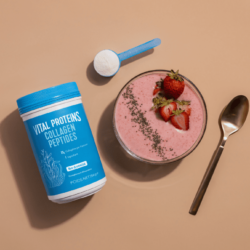Collagen is an essential protein for our bodies and is present in many tissues, from skin and bones to muscles, tendons and blood vessels. As we age, our production of collagen and collagen peptides naturally decreases, which can lead to loss of skin firmness, joint pain, brittle bones and reduced muscle mass. That’s why collagen supplements are gaining in popularity, as they can help stimulate the body’s natural collagen production, offering a range of health benefits. In this article, we’ll explore the different types of collagen, the foods to eat to boost its production, and the benefits of collagen for the skin, joints, muscle mass and cardiovascular health.
What is collagen?
Collagen is a fibrous protein with a complex structure, predominant in the connective tissues of the human body. This protein plays an essential role in the cohesion, elasticity and regeneration of skin, bone, cartilage, tendons and other connective tissues. Its main function is to maintain the strength and flexibility of these tissues, which is crucial for organ protection and support.
Biochemically, collagen is composed mainly of three amino acids: glycine, proline and hydroxyproline. This unique composition facilitates the formation of its triple helix structure, giving collagen its properties of strength and flexibility. What’s more, collagen is the most abundant protein in mammals, accounting for around 25% to 35% of total body proteins, underlining its fundamental importance in body structure.
What are the different types of collagen?
There are several types of collagen, each with specific functions and locations in the body. Of the more than 28 types identified, the most common are :
- Type I: The most abundant, present mainly in the skin, tendons, internal organs and the organic matrix of bones. Type I collagen gives strength and elasticity to these tissues.
- Type II: Mainly found in cartilage. It is essential for the maintenance and repair of articular cartilage and is often associated with joint health.
- Type III: Located in the skin, muscles and blood vessels. It plays a key role in tissue flexibility and is often found in association with type I collagen.
- Type IV: Located in the basement membranes, this type of collagen is important for filtration and is found in places such as the kidneys.
Each type of collagen is adapted to its specific function in the body, whether to provide strength, flexibility or structural support. Understanding these different types is crucial, not only in the context of normal ageing, but also in the management of various connective tissue diseases and in regenerative medicine applications.
Collagen structure
Amino acid composition
The molecular structure of collagen is essentially made up of amino acids, the basic units of proteins. Collagen is made up of three main amino acids: glycine, proline and hydroxyproline. These amino acids are organised in a specific repeating sequence, generally in the form Gly-Pro-X or Gly-X-Hyp, where ‘X’ may be another amino acid. This particular sequence is fundamental to the structure and function of collagen.
Glycine, being the smallest amino acid, plays a crucial role in stabilising the triple helix structure of collagen. Its small size enables the helical structure to be tightly wound. Proline and hydroxyproline, on the other hand, induce turns in the amino acid chain, facilitating the formation of the triple helix structure. The hydroxylation of proline, a process that requires vitamin C, is particularly important because it reinforces the thermal stability of the triple helix.
Triple helix structure
The emblematic structure of collagen is its triple helix. Each helix is a long polypeptide chain, and three of these chains wind together to form a super-helix. This configuration gives collagen high mechanical strength and low elasticity, which is crucial for providing structural support to tissues.
In this triple helix, the chains are stabilised by hydrogen bonds between the amino acids in each chain. This stability is essential for collagen to fulfil its supportive role in connective tissue. The helices then link together to form fibrils, which combine into even larger fibres responsible for the structure and strength of tissues such as skin, bone and tendons.
Alterations in the amino acid sequence or in the formation of the triple helix can lead to connective tissue diseases. For example, a genetic mutation affecting glycine production can disrupt the formation of the triple helix, leading to conditions such as osteogenesis imperfecta, or glass bone disease.
What is the difference between collagen and collagen peptides?
To fully understand the benefits of collagen and collagen peptides, it is crucial to understand the distinction between these two terms, which are often used interchangeably but are fundamentally different.
Collagen
Collagen is a major structural protein in the body, accounting for around 30% of total body proteins. It is essential for the cohesion, elasticity and regeneration of connective tissues such as skin, bones, tendons, ligaments and blood vessels. Collagen is made up of long chains of amino acids arranged in a triple helix, giving this protein its strength and stability.
Collagen peptides
Collagen peptides are fragments of collagen obtained by a process called hydrolysis. This process involves breaking down the long chains of collagen into shorter segments that are more easily assimilated by the body. Collagen peptides are therefore shorter chains of amino acids than native collagen, but they retain the same beneficial biological properties.
The distinct advantages of collagen peptides
One of the main differences between collagen and collagen peptides is their bioavailability. Due to their smaller structure, collagen peptides are more easily absorbed by the digestive system and can therefore enter the bloodstream more efficiently. This allows them to reach target tissues quickly, where they stimulate the production of new collagen and promote tissue repair and regeneration.
What should we eat to boost our collagen production?
The human body naturally produces collagen. This protein is produced by combining several amino acids, such as glycine, hydroxyproline, arginine and proline. We also need to eat foods rich in vitamin C, copper and zinc.
Here are just a few examples of the foods we should be eating to support its production:
- Egg whites
- Dairy products
- Cabbage
- Asparagus
- Pork
- Chicken
- Gelatine
- Beef
- Nuts
- Peppers
- Offal
- Oilseeds & pulses
Properties of collagen-based food supplements
Food supplements based on collagen peptides are currently very popular with consumers. Many people are looking to maintain the health of their skin and joints while slowing down the natural ageing process. Food supplements based on collagen peptides are presented as a natural solution to meet these needs. But what are the real benefits of collagen-based food supplements? How effective are they? In this part of the article, we will review the properties of collagen-based food supplements and their impact on health.
Its role in building muscle mass
This protein also plays an important role in muscle mass gain. Studies have shown that collagen supplementation can help to increase muscle mass and strength in people who follow a regular physical training programme.
A 12-week study carried out on 27 subjects suffering from sarcopenia revealed that taking 15 grams of collagen powder a day, in addition to a physical training programme, significantly increased muscle mass and strength compared with placebo. The subjects in the collagen-supplemented group showed a greater increase in lean body mass and muscle strength, as well as a greater reduction in body fat.
What are the benefits of collagen for the skin?
Numerous clinical studies have demonstrated the effectiveness of collagen peptides in various areas of health. For example, research has shown that regular consumption of collagen peptides can increase skin hydration and elasticity, reduce wrinkles and improve bone density. On the other hand, there are fewer studies on native collagen, mainly due to its low bioavailability when ingested as a dietary supplement.
Collagen is also known for its benefits for skin health. Collagen is a key component of the skin’s structure, giving it firmness, elasticity and resilience. Over time, collagen in the skin naturally degrades, which can lead to loss of firmness, reduced elasticity and the appearance of fine lines and wrinkles.
Taking collagen supplements can help strengthen the skin by stimulating the body’s natural production of collagen. Studies have shown that taking collagen supplements can increase skin density and firmness, reduce wrinkles and improve skin hydration. A randomised, double-blind study showed that taking collagen supplements for 12 weeks significantly improved skin elasticity and reduced the appearance of wrinkles in women aged 35-55.
What are the benefits of collagen peptides for the heart?
Its benefits are not limited to skin and joint health, but also extend to cardiovascular health. Collagen plays a crucial role in the health of the arteries, giving them structure, suppleness and elasticity.
Studies have shown that collagen tripeptides, protein fragments derived from collagen, can help prevent and treatatherosclerosis in healthy humans. A study of 31 healthy subjects showed that taking collagen tripeptides for 6 months significantly reduced arterial stiffness and systolic blood pressure, two major risk factors for cardiovascular disease. Other studies have also suggested that taking collagen may help to reduce inflammation, improve cholesterol levels and prevent the formation of blood clots.
It should be noted, however, that studies on the benefits of collagen for cardiovascular health are still limited and that further research is needed to confirm these results. However, these encouraging results suggest that taking supplements can help maintain optimal cardiovascular health by providing additional benefits to the structure and flexibility of the arteries.
Collagen and bone density
Collagen also plays a crucial role in bone health by providing a solid structure for the bones. As with skin and connective tissue, its production in bone decreases with age, which can lead to a loss of bone density and an increased risk of fractures.
Studies have shown that taking collagen supplements can help improve bone density and prevent bone breakdown associated with osteoporosis. One study of post-menopausal women found that taking collagen for 12 months significantly improved bone mineral density and reduced the risk of fractures. Other studies have also suggested that it may help reduce inflammation in the bones and stimulate the production of new bone cells.
But what about joint pain? It’s true that most studies suggest that taking 10 grams a day in powder form is enough to improve the condition of joints, both in terms of flexibility and joint comfort. It would therefore help to maintain the integrity of the cartilage.
Does the body produce collagen as it ages?
The causes of collagen breakdown
Collagen breakdown is a natural process influenced by several factors, of which ageing is the most significant. With age, collagen synthesis slows down, while the activity of enzymes that break down collagen, such as collagenases, increases. This decrease in production and increase in degradation lead to an overall reduction in the amount of collagen in the body, affecting tissue integrity.
In addition to ageing, other external factors also contribute to collagen degradation. Exposure to UV rays from the sun is one of the main culprits, as it causes the formation of free radicals that damage collagen. Smoking and environmental pollution are also known to accelerate collagen breakdown by increasing oxidative stress in the body.
In addition, eating habits play a significant role. A diet low in the nutrients essential for collagen synthesis, such as vitamin C, copper and proteins, can inhibit collagen production. In addition, excessive consumption of sugar and certain processed foods can encourage glycation, a chemical process that makes collagen rigid and reduces its elasticity.
Effects on the body
Collagen breakdown has a number of visible and invisible effects on the body. Aesthetically, it manifests itself in signs of ageing such as wrinkles, loss of skin firmness and elasticity, and a dull complexion. This reduction in collagen in the skin leads to a loss of structure and volume, which is particularly evident in areas where the skin is thin, such as the face and neck.
Apart from the aesthetic effects, collagen breakdown also affects the structural health of the body. It can lead to a reduction in bone density, increasing the risk of osteoporosis. Joints can also be affected, with reduced flexibility and mobility, potentially leading to conditions such as osteoarthritis.
In blood vessels, the reduction in collagen can reduce the elasticity of the walls, contributing to cardiovascular problems. Similarly, in internal organs, a reduction in collagen can affect their function by altering their structure and integrity.
Source:
- https://www.scielo.br/j/rbgg/a/fk95TfhxB7mPsmqYRDdHH8K/?format=pdf&lang=en
- Biochemistry, Collagen Synthesis – StatPearls – NCBI Bookshelf (nih.gov)
- Physiology, Connective Tissue – StatPearls – NCBI Bookshelf (nih.gov)
- [Postmenopausal osteoporosis. Treatment with calcitonin and a diet rich in collagen proteins] – PubMed (nih.gov)
- westjmed00108-0076b.pdf (nih.gov)
- Physiology, Connective Tissue – StatPearls – NCBI Bookshelf (nih.gov)





